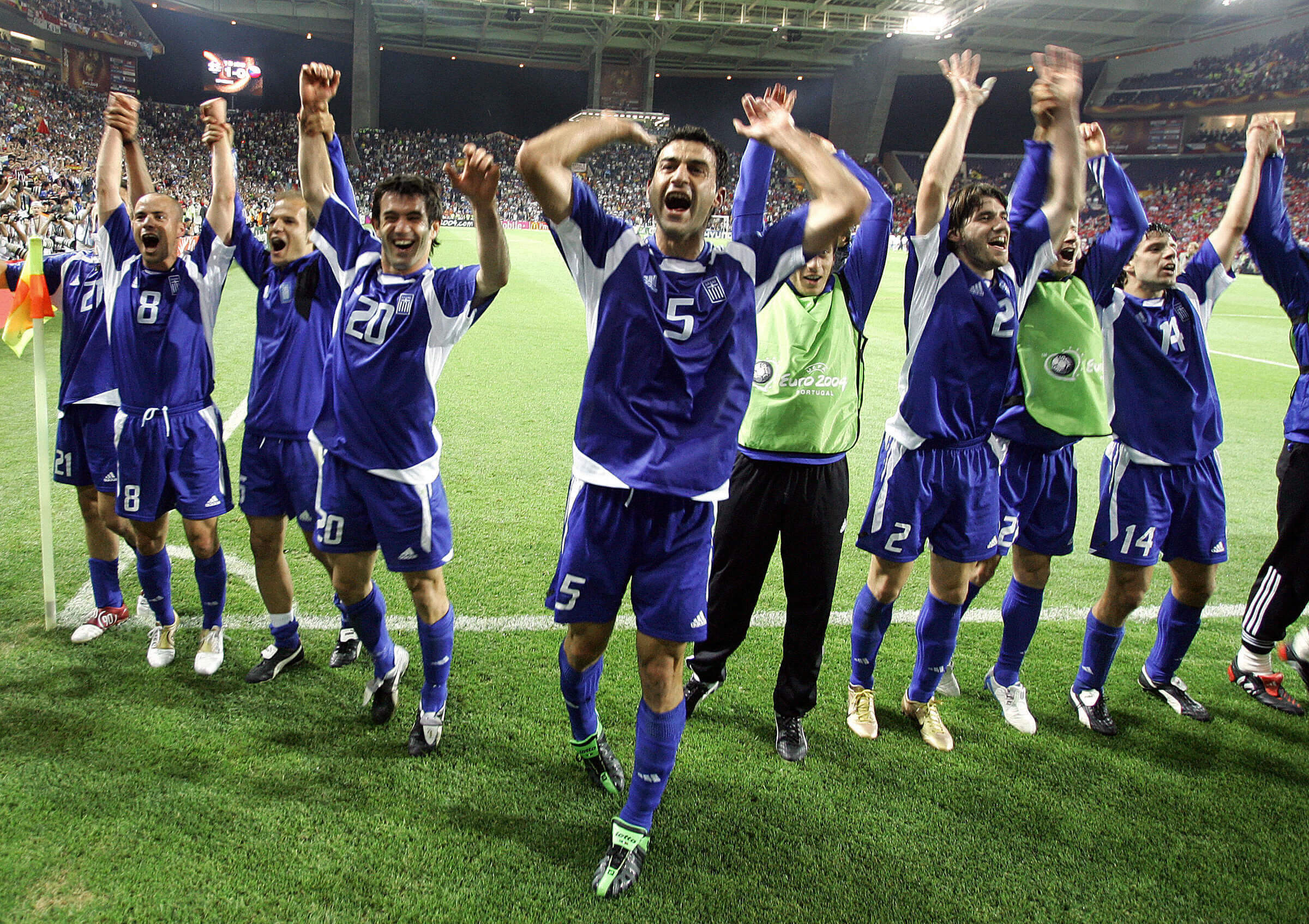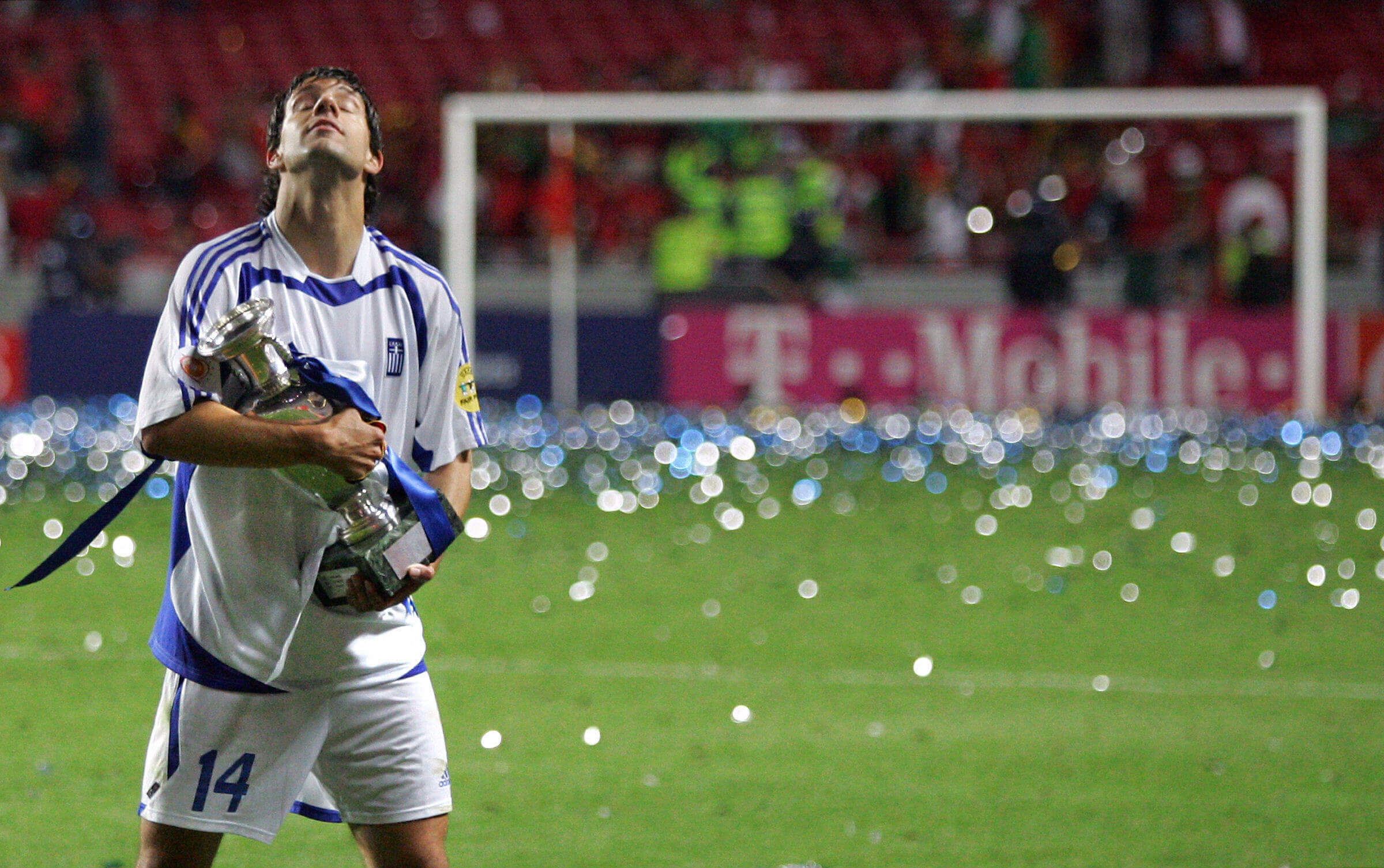Key player
More than any other European Championship success, this was a team effort. Midfielder Zagorakis received plenty of acclaim, finishing fifth in the Ballon d’Or — largely because he was the side’s captain, you suspect — while three-goal Angelos Charisteas was voted into 11th.
But the truly outstanding player was Dellas, who mopped up brilliantly at the back in a manner vaguely comparable to Matthias Sammer eight years beforehand. He was a genuine sweeper, a permanent free man at the back, although most of his decisive contributions came in the air, rather than on the ground like Sammer.
He also very obviously lacked Sammer’s playmaking ability, constantly thumping the ball aimlessly clear and hoofing balls towards the strikers whenever pressured, but Dellas was almost unbeatable in his penalty box. He was particularly good in the semi-final win over the Czech Republic, when he was tasked with acting as the spare man while the more diminutive Michalis Kapsis focused on the towering Jan Koller. But then, when the ball was wide, they would switch roles and Dellas would mark Koller, coping excellently against the 6ft 8in (202cm) target man.
On top of that, he scored the winner against the Czechs in extra time, heading home a right-wing corner in what was officially the last ‘silver goal’ — if a team was leading after either half of extra time, the game would end. However, since Dellas’ goal came on 105 minutes, right on the stroke of half-time in extra time, it was effectively a golden goal.

Traianos Dellas (No 5) leads the celebrations after Greece’s semi-final win over the Czech Republic (Javier Soriano/AFP via Getty Images)You might be surprised to learn…
Before the final, there was a minor scandal in Portugal when it was reported that the referee for the final, Germany’s Markus Merk, a dentist by trade, counted Rehhagel and his family as patients. This inevitably prompted concerns amongst Portugal fans that Merk might favour his compatriot.
“Thank you for the question,” Merk responded sarcastically when quizzed before the final. “If we follow this (logic), then there are no referees in the future because every referee has lots of matches in a foreign country.
“There is nothing unusual in having a German referee and a German coach. I have had about 5,000 dental patients registered in my career — some have even been Portuguese and Greek. I have five favourite restaurants as well: and one is Portuguese and one is Greek.”
The final
A repeat of the opening game, with Greece once again shocking hosts Portugal with a one-goal victory.
The game was, in truth, rather flat, with both sides probably suffering from nerves. Portugal didn’t seem any more prepared for the challenge of the Greek man-marking the second time around, with Cristiano Ronaldo and Luis Figo staying out wide rather than alternating their positions to lose their markers. With Deco struggling to escape the attentions of Kostas Katsouranis, Portugal offered little creativity until the 32-year-old Rui Costa, in his final international appearance, came off the bench to create a couple of half-chances.
Greece’s performance in the final was probably their least impressive of the knockout stage, although it should be remembered that their opponents had home advantage, had an extra day of rest after their semi-final, and were already in Lisbon whereas Greece were travelling down from Porto. Greece got the job done with relatively few worries.

Greece’s Takis Fyssas cradles the trophy (Mladen Antonov/AFP via Getty Images)The decisive moment
For the third game running, Greece won courtesy of a header from a right-wing delivery. Like in the quarter-final, the goalscorer was Charisteas. Like in the semi-final, it came from a corner.
Despite being identified as a potential weakness throughout the tournament, Portugal’s goalkeeper Ricardo performed very well, saving and scoring a penalty in the quarter-final shootout win over England. But his attempt to claim Basinas’ corner was feeble and Charisteas had the simple task of nodding in.
🇬🇷 Angelos Charisteas’ header was the winning goal in the EURO 2004 final as Greece were crowned European champions 🏆#OTD | @EthnikiOmada pic.twitter.com/3M3TAOhpY8
— UEFA EURO 2024 (@EURO2024) July 4, 2023
Were they clearly the best team?
It’s fair to suggest that if you played these knockout stage matches again, you probably wouldn’t get three Greece wins. The Czech Republic were probably the most complete side at the tournament, boasting a brilliant strike partnership of Koller and Milan Baros, a huge amount of midfield creativity, and the best goalkeeper at the tournament, Petr Cech. However, when Pavel Nedved went off injured against Greece in the semi-final, they lost belief.
Aside from the fortune of the best side being deprived of their best player, Greece didn’t need to ride their luck. They weren’t regularly depending upon last-ditch clearances, spectacular saves or the woodwork to keep their clean sheet intact. The pattern of their games involved them being rarely troubled at 0-0, then scoring, then successfully killing the game without resorting to too much timewasting or gamesmanship.
They were unlikely winners, certainly, and needed to play defensively to stand a chance, but there have been many more flukey European Championship successes than this.
In the knockout stage, Greece defeated the defending champions, the best team, and then the host nation: 1-0, 1-0 and 1-0. A few weeks after Porto had stunned Europe with their Champions League success, this was a year for the underdogs. “I have united Greeks in a way beyond any politician,” claimed Rehhagel. He remains the only foreign coach to win the European Championship.
(Top photo: Franck Fife/AFP via Getty Images
Source link : https://www.nytimes.com/athletic/5339532/2024/03/31/greece-euro-2004-history/
Author :
Publish date : 2024-03-30 07:00:00
Copyright for syndicated content belongs to the linked Source.


